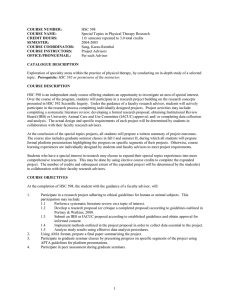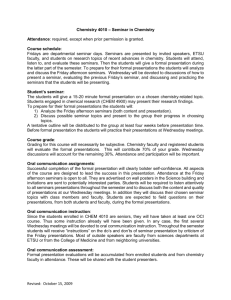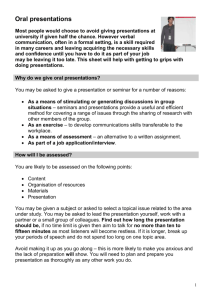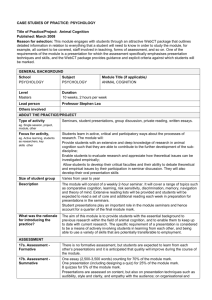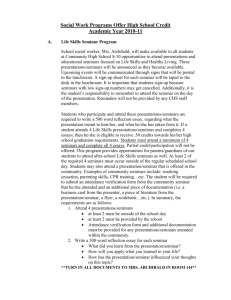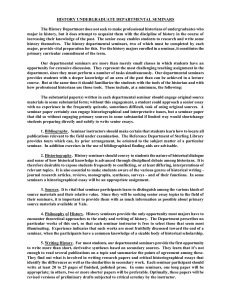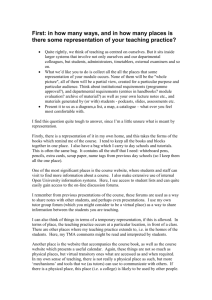Research Methods
advertisement
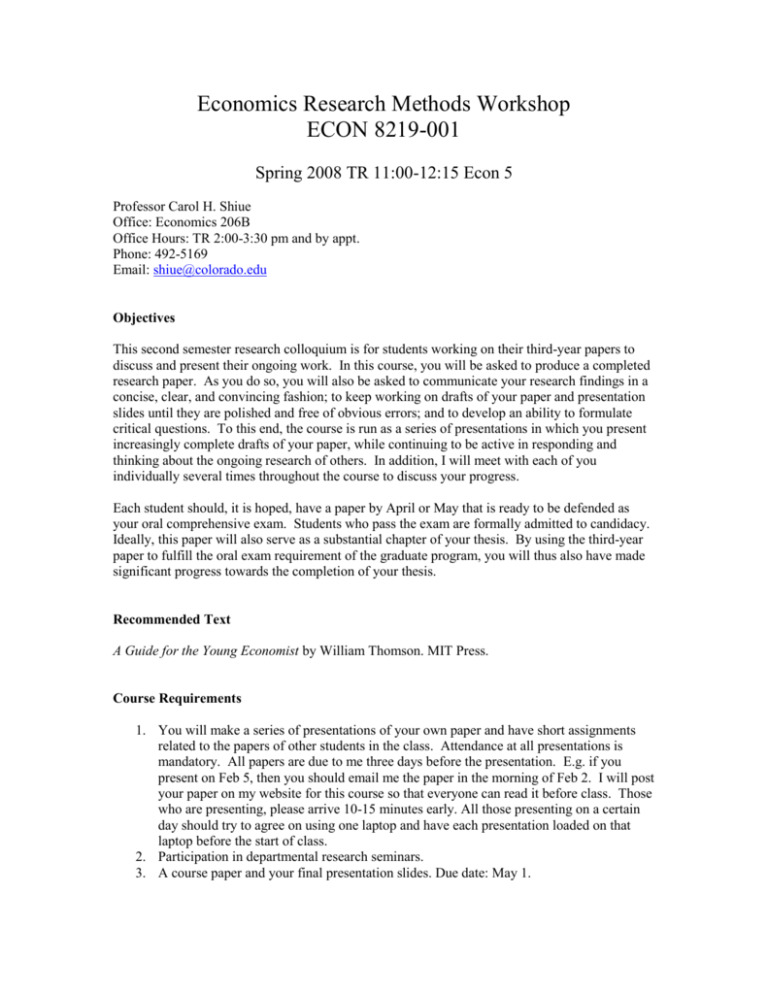
Economics Research Methods Workshop ECON 8219-001 Spring 2008 TR 11:00-12:15 Econ 5 Professor Carol H. Shiue Office: Economics 206B Office Hours: TR 2:00-3:30 pm and by appt. Phone: 492-5169 Email: shiue@colorado.edu Objectives This second semester research colloquium is for students working on their third-year papers to discuss and present their ongoing work. In this course, you will be asked to produce a completed research paper. As you do so, you will also be asked to communicate your research findings in a concise, clear, and convincing fashion; to keep working on drafts of your paper and presentation slides until they are polished and free of obvious errors; and to develop an ability to formulate critical questions. To this end, the course is run as a series of presentations in which you present increasingly complete drafts of your paper, while continuing to be active in responding and thinking about the ongoing research of others. In addition, I will meet with each of you individually several times throughout the course to discuss your progress. Each student should, it is hoped, have a paper by April or May that is ready to be defended as your oral comprehensive exam. Students who pass the exam are formally admitted to candidacy. Ideally, this paper will also serve as a substantial chapter of your thesis. By using the third-year paper to fulfill the oral exam requirement of the graduate program, you will thus also have made significant progress towards the completion of your thesis. Recommended Text A Guide for the Young Economist by William Thomson. MIT Press. Course Requirements 1. You will make a series of presentations of your own paper and have short assignments related to the papers of other students in the class. Attendance at all presentations is mandatory. All papers are due to me three days before the presentation. E.g. if you present on Feb 5, then you should email me the paper in the morning of Feb 2. I will post your paper on my website for this course so that everyone can read it before class. Those who are presenting, please arrive 10-15 minutes early. All those presenting on a certain day should try to agree on using one laptop and have each presentation loaded on that laptop before the start of class. 2. Participation in departmental research seminars. 3. A course paper and your final presentation slides. Due date: May 1. Departmental Research Seminars There are a total of nine departmental research seminars on the schedule so far this semester. This is your chance to sit in the audience and be the seminar critic. You are to go to as many departmental seminars as you can. You are free to choose which seminars to go to, but you must attend at least six seminars. For each seminar that you attend, turn in a 1 page typed response to the paper and its presentation. I will give extra credit if you attend and turn in responses to additional seminars. Do not just summarize the abstract of the paper, instead summarize the seminar and your thoughts about it. - Of all the questions from the audience, which were among the best questions, and why? Your answer may include a question that you asked the speaker yourself. - What was the most compelling aspect of the paper and presentation, and why? - What was the weakest aspect of the paper and presentation, and why? - What lessons, if any did you draw from observing the style of the speaker and the way in which the presentation slides were organized? - Did the speaker defend his paper successfully, in your opinion? If you were presenting this paper, what would you have done or said differently? - Compare this paper and presentation to the previous ones you have seen. Tentative Schedule January 15. Email me a copy of your current paper (in either Word or PDF) and your latest set of presentation slides. January 17. General comments, sign up sheets. January 22-31. Individual meetings, see sign up sheet. February 5-26. In the first round, you present your paper from start to the data section only. Discuss your data, the sources, and present descriptive statistics and preliminary estimates. If you are writing a theoretical paper, you can use the time to motivate your paper with examples and anecdotes of empirical relevance and extend your model. Those who are not presenting are required to read the paper and write down at least two thought-out questions that you would be prepared to ask. The format of these presentations will be the “workshop style”, i.e. you jump in with your question at what you judge to be an appropriate moment. February 26-March 13. In your second round, you present the data section and the results and conclusions of your paper. In addition, for this second round of presentation, there will be one or two discussants assigned to the paper, each of whom will carefully read the paper give a 5 minute response and critique. The presenter is then given time to respond to the discussant’s comments. The format of these presentations will be the “conference style”, i.e., no interruptions apart from quick clarification questions, and then discussant(s) make their comments. March 18-20. Individual meetings, see sign up sheet. March 25-27. Spring Break, No Classes. April 1-May 1 Final presentation of the paper from start to finish. Your main advisors will be asked to be present at this final presentation whether or not it qualifies as your comprehensive exam. Comprehensive Examination Guidelines The exam is a one hour long presentation that is based on your third-year paper. Your final presentation in ECON 8219 can serve to fulfill this requirement. However, your main advisors must agree that you are ready. (Note: even if your advisors think you are not yet ready for your comprehensive exam, you still have to make a final presentation in ECON 8219.) You should do your best to work closely with your advisors and try to complete the comprehensive requirement in the Spring semester so that you can move on to the other papers in your dissertation. This is only one of several papers that you will have to write for your dissertation! Students must schedule their comprehensive exam before the Fall semester of their 4th year. Do not count on doing it during the summer since many faculty members are out-of-town at various times and may not be available. At least 5 faculty members must be present at the exam. These people include your primary and secondary advisors. In consultation with your advisors, you are responsible for contacting and scheduling three additional faculty members who can serve on your comprehensive exam committee. This should not be too difficult. If the comprehensive exam takes place in ECON 8219 during Spring 2008, the instructor of Econ 8219 will serve as one of the committee members. There will also be a departmental Comprehensive Exam Committee of 6 faculty members who will be available for serving on Comprehensive Exams. The written paper (i.e., your 3rd year paper) including references and all results, must be circulated to the comprehensive examiners two weeks prior to your presentation. This is important. You can expect the format of your presentation to be similar to that of a typical economics seminar, where you may be interrupted with questions as you speak. Examiners may raise any issues that they wish, but generally, the questions and comments will be relevant to your research paper topic. At the end of your presentation, everyone except the comprehensive exam committee will be asked to leave the room so that the committee can discuss the outcome. The candidate however, should wait outside the room. After a few minutes he or she will be invited back in the room to be told the results. Hopefully, the decision is positive. In most cases, it is. Grading Grading will be determined by the quality of your presentations, with greater weight given to your final presentation and paper. Your class participation, the thoroughness of your responses to the presentations of others in class as well as in departmental seminars is also part of the course grade. For the shorter assignments grading will be based on a scale from 0 to 2. Class participation & shorter assignments Class participation (10%) Questions & discussant assignment (10%) Department seminar assignments (10%) Presentations and paper First round presentation Second round presentation Final presentation (20%) and paper (30%) 30 70 10 10 50
